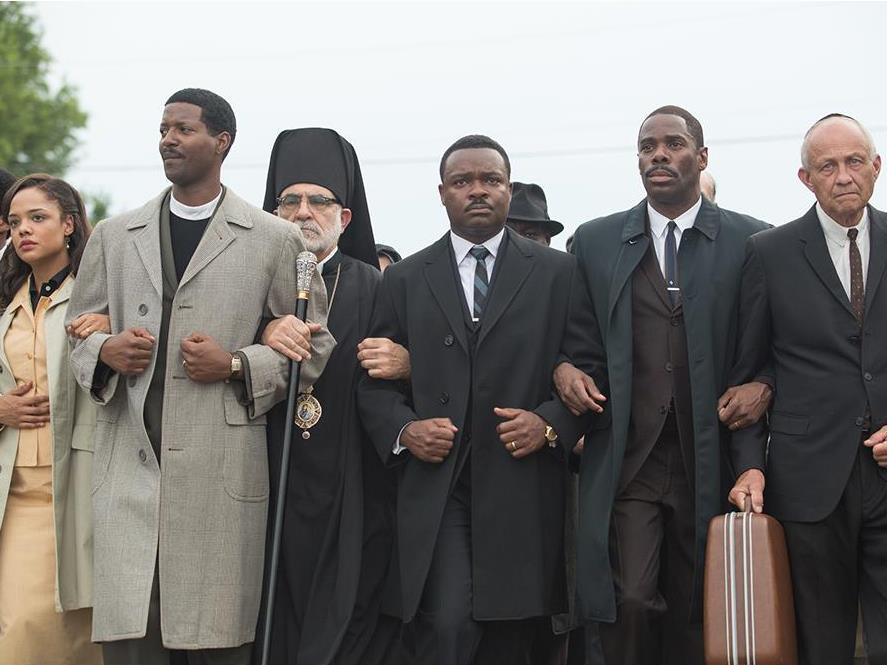The extraordinary often blooms from ordinary beginnings, a series of unexceptional steps taken or choices made soon becoming something special. So starts Selma, the film, with the Rev. Dr. Martin Luther King, Jr. (David Oyelowo, Interstellar) readying for and then accepting the Nobel Peace Prize. So also commences the Selma to Montgomery marches in 1965 that provide the feature with its basis, born of sadly routine racial discrimination and the corresponding frustration that it brought. Neither remain commonplace for long; both are swiftly established as not just noteworthy, but astonishing.
Director Ava DuVernay (Middle of Nowhere) and first-time writer Paul Webb use the latter to drive the former, making their movie a portrait of a movement, as well as a man. The picture they paint is purposeful, made of small moments and big outcomes. King’s award ceremony is cannily, heartbreakingly intercut with the deaths of four young girls in the 16th Street Baptist Church bombing in Alabama. The failed attempt by Selma resident Annie Lee Cooper (Oprah Winfrey, The Butler) to register to vote then follows, an effective example of prejudice in its everyday form.
The shocking tragedy gives civil rights advocate King more fuel for his pleas to President Lyndon B. Johnson (Tom Wilkinson, Felony) to act on true voting equality, while the institutionalised rudeness illustrates his point. Such heinous crimes weren’t uncommon in the state or in the south, but local government refusal in allowing African American citizens to fulfil the necessary formalities to participate in elections – and also be allowed to serve on juries – saw perpetrators remain unpunished. Told to bide his time once more, while continuing to witness violence against those just trying to exercise their rights, King and his supporters mobilise a crowd to walk from Selma in protest.
Even if plainly and dryly handled, the process that resulted in the eventual elimination of voting impediments would still have made for emotional viewing. That’s not how DuVernay approaches the true tale, though neither does she ignore the details. The filmmaker displays an expert understanding of the tone, mood and pacing required to work through such a complex situation, and not just in her revisions to the script that saw her rewrite all King’s speeches due to permission issues. Prudently, she gathers force in the assembling of ideas and exchanges that lead to action. With precision, she accumulates events and ire, shots and sentiment, making a shoe flying amongst debris and an intimate encounter between a grieving grandfather and the man whose cause he serves as quietly blistering as an explosion and an unprovoked attack in a diner.
Politics isn’t the only subject of discussion, with the personal toll – on King and his wife, Coretta Scott King (Carmen Ejogo, who also played the same role in 2001 TV movie Boycott), as well as on the many that follow his lead – just as instrumental in the unrelenting atmosphere of tension that echoes through Selma’s every frame. DuVernay’s choice to focus on one particular slice of history allows the respective real-life characters to live and breathe, to become more than merely notable contributors to an important broader story, including textured – even when brief – portrayals of Ralph Abernathy (Colman Domingo, Lincoln), Andrew Young (André Holland, TV’s The Knick), James Orange (Omar J. Dorsey, Ray Donovan), and Diane Nash (Tessa Thompson, Dear White People) from among King’s inner circle.
If one scene epitomises DuVernay’s abilities with the material, it is Selma’s most climatic – on-screen and off. The 600-strong marching group crosses the Edmund Pettus Bridge over the Alabama River, the reception that meets them both brutal and televised to millions of viewers. Driven by the fluid work of skilled cinematographer Bradford Young (Ain’t Them Bodies Saints), the film emulates the blunt force, physically and emotionally, that rained down on those there and watching, knowing how to make an impact without being graphic. Finessed editing by Spencer Averick (a veteran of the filmmaker’s previous two efforts) weaves the two together carefully, but never shying away from the inherent confrontation, either. It is a remarkable sequence in a remarkable movie
Just as DuVernay proves gifted in conveying the feeling of the events that litter the narrative, Oyelow masters his portrayal of the central figure. His King is graceful and considered, impassioned and motivated, and solemn and angry, always in combination. His tenor delivering several speeches imitates not only the rhythms of King’s oration, but their resonance. Oyelow’s isn’t the only exceptional contribution, with the film’s ensemble stacked with stellar turns in little and large bursts playing those on all sides of the issues, such as Common (Now You See Me), Tim Roth (Grace of Monaco) and Giovanni Ribisi (A Million Ways to Die in the West).
History has judged the reality that provides Selma’s stirring, striking story, and so too will the feature itself – and its reception, and the accompanying debate – leave a mark over time. Its lack of recognition among the Academy Award nominations for best director and best actor doesn’t diminish or discredit its power. Instead, it adds a further chapter and another layer, underscoring the moving movie’s relevance not only as a document of specific circumstances, but as its importance as a parallel to contemporary society.
Rating: 5 stars out of 5
Selma
Director: Ava DuVernay
US/UK, 2014, 128 mins
Release date: 12 February
Advanced screenings: 6-8 February
Distributor: StudioCanal
Rated: M
Actors:
Director:
Format:
Country:
Release:





